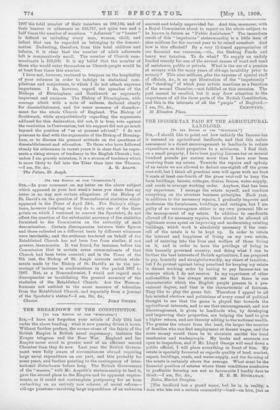THE BREAKDOWN OF THE CONSTITUTION.
[To Tun immix Or THIS ..spscriTos.-j Srn,—I have not forgotten your article of July 25th last under the above heading : what is now passing drives it home. Without further preface, the corner-stone of the fabric of the British Empire is British naval supremacy; instance the Kruger telegram and the Boer War. England and her Empire never stood in greater need of an efficient second Chamber than they do now. Last year the British Govern. ment were fully aware of circumstances abroad requiring large naval expenditure on our part, and this probably for some years, and further pointing to the contingency of inter- national disturbance before long. The British Government of the " masses," with Mr. Asquith's statesmanship to lead it, gave the second place to the Empire and its apparent require- ments, as it could not contemplate postponing for an hour embarking on an entirely new scheme of social reform- old-age pensions—involving large expenditure of an unknown amount and totally unprovided for. And this, moreover, with a Royal Commission about to report on the whole subject, to be known in future as "Public Assistance." The immediate result of this "impetuous" statesmanship is a little item of nine millions for the current year to be raised somehow. And how is this effected? By a very ill-timed appropriation of our financial war resources,—viz., the Sinking Funds and heavy war taxation. To do what P To supply an unduly limited remedy for one of the several causes of want and need of assistance, public or private. What is the use of a pension at seventy with the many years of old-age invalidity prior to seventy P This nine millions, plus the expense of special staff of officials, &o., is an apt illustration of the " impetuosity " the "checking" of which your article mentions as a function of the second Chamber,—not fulfilled on this occasion. The past cannot be recalled, but it may draw attention to the importance of all the three parts of the British Constitution, and this in the interests of all the "people" of England.—










































 Previous page
Previous page